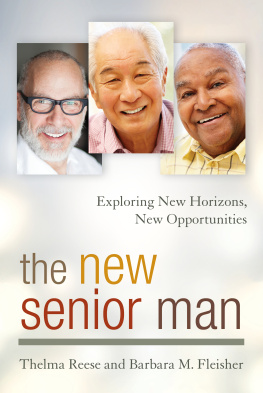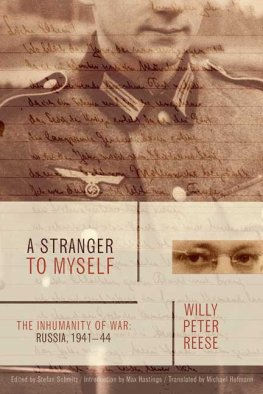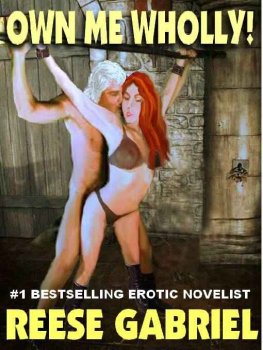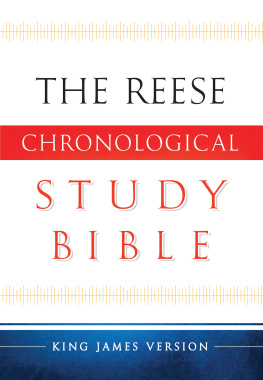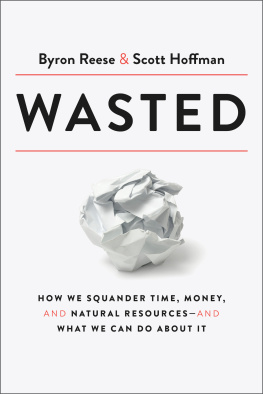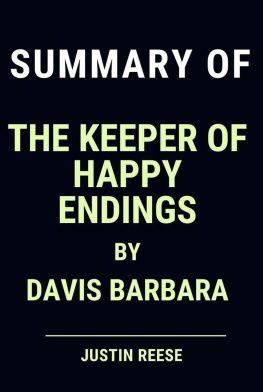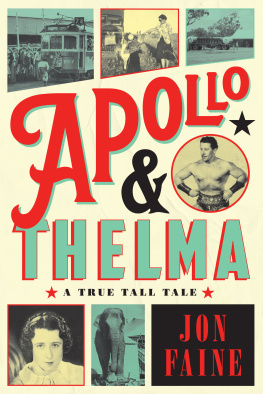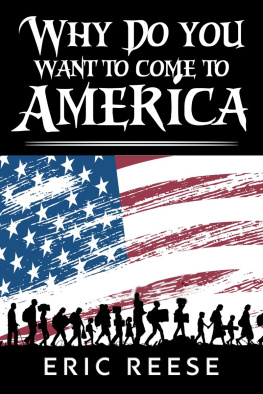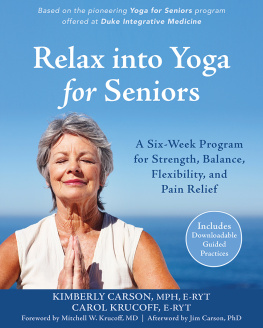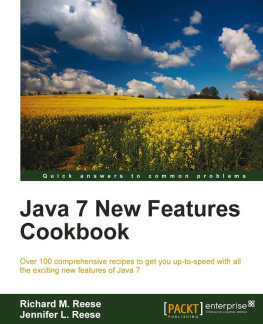Thelma Reese - How Seniors Are Saving the World
Here you can read online Thelma Reese - How Seniors Are Saving the World full text of the book (entire story) in english for free. Download pdf and epub, get meaning, cover and reviews about this ebook. year: 2020, publisher: Rowman & Littlefield Publishers, genre: Politics. Description of the work, (preface) as well as reviews are available. Best literature library LitArk.com created for fans of good reading and offers a wide selection of genres:
Romance novel
Science fiction
Adventure
Detective
Science
History
Home and family
Prose
Art
Politics
Computer
Non-fiction
Religion
Business
Children
Humor
Choose a favorite category and find really read worthwhile books. Enjoy immersion in the world of imagination, feel the emotions of the characters or learn something new for yourself, make an fascinating discovery.

- Book:How Seniors Are Saving the World
- Author:
- Publisher:Rowman & Littlefield Publishers
- Genre:
- Year:2020
- Rating:3 / 5
- Favourites:Add to favourites
- Your mark:
- 60
- 1
- 2
- 3
- 4
- 5
How Seniors Are Saving the World: summary, description and annotation
We offer to read an annotation, description, summary or preface (depends on what the author of the book "How Seniors Are Saving the World" wrote himself). If you haven't found the necessary information about the book — write in the comments, we will try to find it.
How Seniors Are Saving the World — read online for free the complete book (whole text) full work
Below is the text of the book, divided by pages. System saving the place of the last page read, allows you to conveniently read the book "How Seniors Are Saving the World" online for free, without having to search again every time where you left off. Put a bookmark, and you can go to the page where you finished reading at any time.
Font size:
Interval:
Bookmark:
Thelma Reese, EdD, retired professor of English and of Education, created the advisory council for Hooked on Phonics and was its spokes-person in the 1990s. In that role, and as director of the Mayors Commission on Literacy for the city of Philadelphia, she appeared frequently on television and hosted a cable show in Philadelphia. She was a founder of Philadelphia Young Playwrights, chaired the board of Childrens Literacy Initiative, and organized the World Symposium on Family Literacy at UNESCO in Paris in 1994. She is a member of the national organization Life Planning Network and of her local positive aging group. She is coauthor, with Barbara Fleisher, of The New SeniorWoman: Reinventing the Years Beyond Mid-Life and The New Senior Man: Exploring New Horizons, New Opportunities, both published by Rowman & Littlefield, and has been an invited speaker at senior centers, senior living communities, and community centers about both books. A mother and grandmother, she lives in Philadelphia with her husband, Harvey Reese, author and artist.
BJ Kittredge, MEd, is a retired consultant to the healthcare industry. Her professional career began in the public school classroom where she taught elementary, middle, and high school. She was selected for the New Jersey Department of Education Academy for the Advancement of Teaching and Management. She served as chair of a district-wide K12 science curriculum development project and was a Geraldine R. Dodge fellow at Wesleyan University.
She moved from the academic sphere into operations in a major Philadelphia accounting firm and then a small publishing company. From there she was the first director of training and development in the member services division of US Healthcare. There she worked on the design and implementation of the department transition to self-directed teams. She authored and delivered original management training, Speakeasy communication skills programs, operations manuals for new IT systems, and a system for performance evaluation. She is the widow of Patrick W. Kittredge, Esq., and a proud mother and grandmother.
I n the Introduction, the authors said, This is a time when the lengthening of life coincides with an explosion of change. Do you still want to keep up with the changes taking place around you? What are some changes that are important to you, things that you find meaningful? Which changes do you see that you cant resolve in your mind?
When you look around in todays world, is there something meaningful to you that you think needs to be fixed? What have you learned through your life experience that could be a significant insight into a solution for this fix?
Each person in this book is using something they have inside themselves to make the human condition better. Does it occur to you that you have something to give that you hadnt realized you have? What is it?
Where are you in your life? Have the constraints of earning a living, raising children, preparing for the future eased at all? What would you choose to respond to if you had no limits?
Today there are many calls for help: some we sense when we look into anothers eyes; some we witness face to face. Some we know because we recognize that things are not as they should be. What do you care about profoundly? Where could you use your skills and your passion to answer the call for help?
Between the chapters, there are essays on some of the aspects of aging. There is a running theme among them: to engage, act, contribute, grow. Is there a way to make room in your schedule, in your life, to embrace a passion? Can you see yourself using that theme, following those steps?
Curiosity can be a path to discovery. But discovery usually implies leaving the comfortable and familiar life that we settle into in our senior years. In , Cirel and Cathy have built lives of discovery in very different ways. They also seem to be strongly motivated and decidedly fulfilled. Have you been curious about issues in your observations of life today? Can you apply your experience to engage in the dialogue these issues create? How?
There is no shortage of research about the positive effects of engagement, particularly in aging individuals. If you look at the word you see how it includes aging: eng aging. Would you enjoy more opportunities to broaden your perspective, to add to your connections? How would activism further that goal?
The people profiled in this book have chosen positive activism at a time when there is plenty of negative influence in the world. Do you think there is negative activism? If so, what could be done about it; what should be done about it?
T he German sociologist Ferdinand Tnnies (18551936) defined community as groupings based on feelings of togetherness. He called it Gemeinschaft; the membership in this group was self-fulfilling. Mignon Adams grew up in small towns with that sense of community. When she was a young girl, her family moved from Oklahoma to Illinois, where the community was a close-knit group who knew each other well and shared the same values and conventions. During the 1970s she was involved in feminist activism. Mignon received all of her higher education, certification, and degrees from universities in Illinois. She earned a masters degree in library science.
She was accustomed to living and working in small college towns, where she enjoyed a vibrant social and cultural life. When she and her husband moved from Oswego, New York to Philadelphia, she served as director of Library and Information Services at the University of the Sciences for twenty-one years.
But the move initially had its social challenges. Mignon was used to a small, familiar group of friends and associates who shared activities in the bustling college towns where she had lived and worked. There were many cultural and informative events, activities that kept her connected and up to date. There was always something happening to explorefor entertainment, for learning, for fun. She found the transition to a city the size of Philadelphia difficult. The sheer volume of opportunities and the extensive network of people spread over a broad expanse meant she had to approach her desire for connection differently.
I used to be able to jump in a car and drive to where I wanted to go. But there were no driveways or individual garages. And the traffic! It certainly was good to increase my walking abilities. Where was the yard to let the dog out? Well, this was another good way to work on walking abilities.
In a small town, neighbors see you coming and going. But they dont gossip about you.
Those you work with dont live close, so you dont see them outside of work. Many things are more expensive in cities, like concerts; in small towns, plays and performances are low in cost; parking is no charge.
But Ive learned to get places without a car. I got to know other people in other kinds of communities: church, clubs, etc. Walking was good for my health. I took up volunteer ushering, and I choose more carefully what I attend.
In the latter part of the twentieth century, older adults often found themselves in a dilemma. The desires and expectation of seniors, many of whom were living alone, were very different from the generation that came before them. For the first time, women, as well as men, had careers. They were active and willing contributors to life in their society.
Among baby boomers, one of the catchphrases heard often is aging-in-place. You read about it in newspapers;
As millions of us grow older, it is a concept that can be enticing. In these modern, peripatetic times, kids, family, and friends scatter to faraway places; we connect with phones and electronics. We dont want to be a burden, and they dont want to feel guilty that we have needs.
Font size:
Interval:
Bookmark:
Similar books «How Seniors Are Saving the World»
Look at similar books to How Seniors Are Saving the World. We have selected literature similar in name and meaning in the hope of providing readers with more options to find new, interesting, not yet read works.
Discussion, reviews of the book How Seniors Are Saving the World and just readers' own opinions. Leave your comments, write what you think about the work, its meaning or the main characters. Specify what exactly you liked and what you didn't like, and why you think so.

